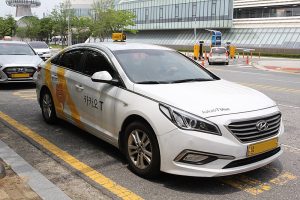Over the past 20 years, all of the world’s major economies have had to contend with labor displacement. First, automation reduced the demand for workers in the manufacturing sector. Now, innovations in information technology threaten to disrupt the service industry.
South Korea is not immune to these forces. The National Assembly recently called on heads of large online platform companies to testify on their antitrust behavior, their lax attitude toward workplace safety, and other issues tied to the growing precarity of workers. But while lawmakers are willing to grill these companies when they are in the spotlight, the prevailing public policy trend has been to shift the social and economic costs of the market disruption away from early tech adopters. Case studies of Seoul’s responses to the advent of ridesharing apps and allegations of labor exploitation in the sector hint at this pattern.
As new and old actors vie for market share, public policy must balance the needs of three broad groups: first movers that prove the commercial viability of the technology; new entrants that introduce improvements; and stakeholders of industries that are being disrupted.
In the case of ridesharing apps, these groups correspond with established domestic app companies like Kakao Mobility, new platforms looking to emulate Kakao’s success, and traditional taxi drivers whose livelihood is threatened by the proliferation of these new services.
Acknowledging the political need to accommodate taxi drivers but unwilling to curb the growth of successful platform businesses, Korean regulators decided to split the difference. In November 2020, the Ministry of Land, Infrastructure and Transport announced the introduction of a 5 percent tax on the profits of ridesharing apps, with the proceeds channeled to a fund that will support the traditional taxi industry.
Although the government extended short-term exemptions for smaller ridesharing apps that operate less than 100 licensed cars, the new levy proved advantageous for larger players in the market. The tax effectively established a barrier to entry for new platforms because it imposed new costs to scaling their operations. Meanwhile, established players could pass any new costs to their existing users while also benefiting from the reduced competition in the marketspace.
There are two potential long-term consequences of South Korea’s decision to champion these established tech adopters over newcomers. First, it could dull innovation. Looking back, later entrants to the technology market consistently delivered innovations to existing goods and services. For instance, Texas Instruments introduced the first commercial transistor radio – but it was Sony’s later product that truly set off the consumers’ still-ongoing love affair with hand-held media players. By placing a ceiling on the number of viable players in the ridesharing space, South Korea will have fewer competitors and lower the impetus for innovation.
Second, new entrants are poised to be the principal job creators in the Korean economy. Small and medium enterprises (SMEs) employ 80 percent of the labor force. Unlike the saturated traditional manufacturing sector, the platform market offers ample room for entrepreneurs to found new businesses and absorb the country’s highly-trained labor force. Precluding this potential by allowing a few early entrants to quickly dominate the market may exacerbate the employment insecurity plaguing the South Korean economy.
But what about stakeholders in industries being disrupted? The ridesharing case makes it appear as if the government is focused on softening the impact of the transition. However, developments in the service sector more broadly suggest that even the meager concession extended to the taxi industry is an outlier.
As the advent of delivery platforms and other consumer-facing apps force job seekers to take on gig work over full-time employment, working conditions in the service sector experienced a sharp decline. In particular, consumers’ growing reliance on home delivery since the outbreak of COVID-19 placed severe demands on workers of e-commerce companies. Several deaths have been attributed to the resulting overwork.
In response, the South Korean state has attempted to impose a 52-hour ceiling on the work week. But this proposal faced pushback from SMEs, particularly manufacturers, that saw these protective measures as a potential roadblock in their ability to compete against larger actors in the market.
In the end, several compromises nullified tangible improvements that this new law could have delivered to service workers. Employers were allowed to demand more overtime as long as workers had an average of 52-hour workweeks over a period of six months. Moreover, firms with five to 29 employees were permitted to ask for 60-hour work weeks.
Meanwhile, the government failed to close a well-established loophole exploited by larger companies to get around compliance: hiring workers as independent contractors. Many e-commerce companies hire their couriers on a part-time basis, allowing them to bypass rules and continue imposing heavy workloads on their employees.
These tensions are by no means unique to South Korea. They are analogous to fights taking place in the United States over the behaviors of service providers like Uber and Amazon. And there is an underlying logic to Seoul’s approach – large domestic platform companies are more likely to successfully fend off foreign online service providers that look to capture not only domestic clientele but also their data. Additionally, the country has a history of moving up the value chain and building globally competitive industries by allowing select firms to become cartels.
But this approach comes with costs – principally, greater precarity and social anxiety. South Koreans, alongside other countries looking to emulate Seoul’s path, should be clear-eyed about these consequences.

































